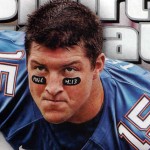Each week in The Holy Huddle, Doug Hankins takes a look at the goings on of the sports world from a distinctly Christian perspective.
As with any job, being a professional sports athlete requires a separation between personal and professional perspectives. Failing to do so, results in the professional side suffering due to personal troubles. In the past month, the sports world has tuned in to a soap opera of professional/personal balance that centers on the statements of three actors.
Metta World Peace, Forward, Los Angeles Lakers
As if elbowing James Harden in the cranium was not enough, Mr. World Peace literally added insult to injury. When asked if he would reconcile with Harden in the upcoming playoff contest, MWP brashly told reporters, “I don’t shake substitutes’ hands,” referring to Harden’s role as first man off the bench of the Oklahoma City Thunder’s NBA team. This personal opinion was given as a professional statement—and the twitterverse went crazy with buzz.
Josh Beckett, Pitcher, Boston Red Sox
Mr. Beckett recently skipped a game due to injury and then played golf the next day. When asked to account for his actions and whether he feels a sense of guilt, Mr. Beckett gave the following personal opinion:
Not on my off day . . . We get 18 off days a year. I think we deserve a little time to ourselves.
Accordingly, fans and reporters (who help to pay his $16 million/year salary) were outraged and vocal in their frustration.
Ron Brown, Assistant Coach, Nebraska Cornhuskers
Mr. Brown made headlines in April when he attended an Omaha City Council hearing to oppose an ordinance protecting gay and lesbian citizens from discrimination. During his three-minute plea, Mr. Brown asked with the council to remember the “great accountability for the decision you are making.” The only problem with Mr. Brown’s personal plea is that he listed Memorial Stadium, the location where the state-funded University of Nebraska football team plays its home games, as his residence. Nebraska athletic director and legendary retired head coach Tom Osborne briefly commented on Mr. Brown’s actions saying, “I think it’s important that there be clarity with what you do in your capacity at the university and what you do as a private citizen.” In light of this professional faux pas, Mr. Brown quickly apologized.
Commentary and Conclusion
These three case studies highlight the double edged nature of celebrity. A public figure’s job is perceived as their master status. Thus, any time athletes, or any other professionals for that matter, act and speak publicly, they represent and speak for their organizations whether they intend to or not. The reason is simple: Fans have difficulty separating the professional and personal in the modern world of reality television and 24-hour news cycles. Call it the Katniss Principle, as thedailybeast.com writer Glyniss MacNicol has defined it:
Unlike those of us who agonize over the ever-shifting privacy concerns of social-media sites like Facebook, Katniss is not only constantly aware of the public gaze, but is so reconciled to its realities that is does not even merit any sort of reflection. Instead she quickly learns to adjust her behavior to take as much advantage of her public persona as she can . . .
Whether he intended to or not, MWP spoke for the Los Angeles Lakers organization: Lakers’ starters don’t shake hands with substitutes. When Josh Beckett skipped a start and played golf, he acted as a symbol for the Boston Red Sox organization. And when Mr. Brown spoke out against homosexuality in favor of the Bible, he did so as a mouthpiece for the University of Nebraska. I am not suggesting that MWP, Mr. Beckett, or Coach Brown change their beliefs. I am merely suggesting those in public positions use caution in the delicate responsibility they have to represent the interests of their organizations.
So the question arises, “How should Christian public figures balance private views and public engagement?”
I suggest that Christian public figures adopt three disciplines:
- Remember the wise words that one of my coaching friends tells his players, “Words you write (public) come back to bite. Words in the air (private) stay there.”
- Frame any public remarks with the phrase, “In my personal, and not professional, opinion.”
- Verbally acknowledge awareness of any diverse interests of the organization you represent. This will counter the “narrow-minded” label from objectors.











